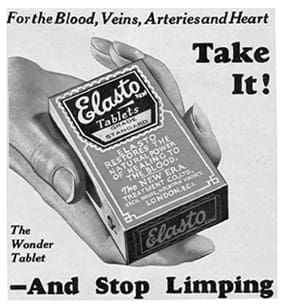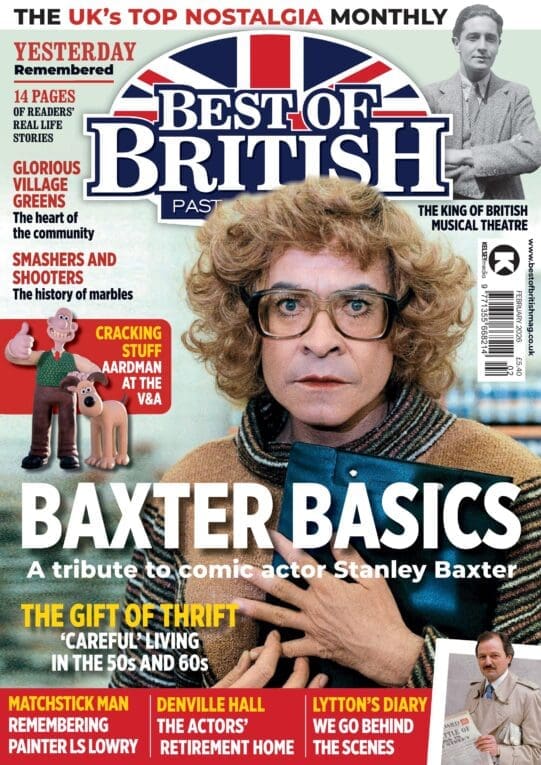Curing ailments in the pre-NHS years.

After asking how much, Dad had barely extracted a £5 note from his wallet when the doctor said, “That will do nicely.” For something that had taken less than five minutes, he pocketed what it took Dad a week to earn.
It all began during a voyage home from the Far East at the end of 1944, when smallpox had broken out on board my father’s ship. The seaman with the disease was quickly quarantined and, although he sadly died, thankfully no one else went down with the killer disease. To be on the safe side, all those on board were ordered to send telegrams to their families telling them to get vaccinated before the men disembarked.
Enjoy more Best of British Magazine reading every month.
Click here to subscribe & save.
To Dad’s horror, on arriving home he discovered that Mum had put it off because I was such a miserable baby. Before he’d even changed out of uniform, Dad arranged for the doctor to call.
Although Mum was annoyed when she realised they weren’t getting any change from the fiver, she wasn’t surprised. During her childhood, if you were poor, calling on the services of a doctor – if you could find one willing to attend – was an act of last resort.
Instead, our neighbourhood relied heavily on the services of Mrs Mason the local midwife, and Mr Ferris from around the corner. Mr Ferris was trained in first aid and, out of the goodness of his heart, tended to knocks, bumps, scrapes and minor ailments, including lancing the odd abscess. If they were noticed at all, normal childhood ailments generally went untreated.
When I began school in 1949, the headmaster’s study was rigged out as a surgery, complete with a hospital screen, and eye chart on the wall. A desk lamp and a white enamel kidney dish filled with wooden tongue depressors sat on the headmaster’s desk. After a nurse had weighed and measured us and tested our hearing and sight, a doctor examined us and took our medical history. We were regularly checked for head lice and given the choice of a school dentist if we wished.
In the Fifties, with the discovery of vaccines for many diseases, mass vaccinations were carried out at our school and later on in a general schools clinic on the other side of town. As we lined up with a bared arm the boys passed the time scaring us with horrible tales of what could go wrong. One by one we disappeared behind a screen for the nurse to give us a scrape or a jab, depending on what protection we were getting, and we all waited with bated breath to see who would faint first.
Medicines were dispensed in returnable glass bottles, and frequently came in foul tasting liquid form with ‘The Dose’ in large black letters on the label, along with the chemist’s handwritten instructions for how much and when. Rubbing liniment, which came in identical bottles, bore a red skull and crossbones and warned it was not to be taken internally, while ointments and small pills came in dinky white cardboard boxes which, when the contents had been used up, were ideal for keeping odd buttons, pins and beads in.
A spicy-tasting Beecham Powder, tipped from its waxed paper wrapping straight on to the back of the tongue and washed down with a drop of milk, was good for headaches. Aspirin was only for when we had a temperature, whilst a daily spoonful of Malt and Cod Liver Oil helped keep coughs and colds at bay.
If we did succumb, a liberal dollop of Vicks Vapor Rub massaged into our chest and back at bedtime helped no end. Mum also used to put a dab of Vicks under my nose and then my eyes.
Mum checked our hair regularly for unwanted visitors and if things looked suspect smothered our hair with a greasy foul smelling, yellow liquid, which had to be applied before bedtime and left on all night. It was horrible, but it was better than the humiliation of being sent home with a letter from the nit nurse.
When home remedies failed, our doctor’s surgery was located in the cobbled courtyard of a Tudor building. In those days there were no computers, queuing systems, receptionists or nurse, but we rarely had to wait more than an hour to see him. Often it was less and somehow we always knew whose turn it was without a word being spoken.
Formerly part of the stable block, with red brick, wisteria-smothered walls, the waiting room was small and cosy. In summer, the perfume of old-fashioned flowers and birdsong wafted in through the open door. In winter, an ancient gas fire popped and hissed threatening imminent explosion, accentuating the mingled smell of surgical spirits and Mansion floor polish. Its heat made us drowsy as we sat uneasily on a motley assortment of sturdy Victorian, straight-backed chairs.
When we visited the doctor, we wore our Sunday best, and were under threat of death if we made a noise in the waiting room, because his surgery was in the next room and the walls were rather thin. We tried not to eavesdrop as the murmur of voices drifted through the wall, but it was more than flesh and blood could bear. Although we couldn’t make out what was being said, we automatically stiffened when the voices stopped, because it meant that the patient was being examined. Too long a silence and we would begin to feel anxious and would quickly check the person’s expression when they left.
Because he knew most of us by name, before we were even seated, Dr Clark had retrieved our file from a battered wooden cabinet in the corner of the room. If we needed a blood test, he would take an enormous syringe from a steaming autoclave, draw an armful of blood, label the phial, and in two or three days we would have the results. If we needed an X-ray, we would be sent to the hospital and there was never more than a few days wait to have the results.
When we were too ill to visit the surgery, the doctor made home visits. Frequently white-faced with exhaustion, especially during influenza outbreaks, nevertheless he was always gentle and concerned as we reeled off our symptoms. Three days after his first visit he would automatically call again to make sure we were on the road to recovery and at that point, to perk us up, would invariably prescribe a bottle of vivid orange, but pleasant tasting, tonic to complete the cure.
No matter how long it took, he would sit with us whilst we gave birth and be there at the end. He was a family doctor, with the emphasis on family, and I mourn his passing.
Di Rayburn, Bracknell, Berkshire
This article appeared in the November 2009 issue of Best of British.

